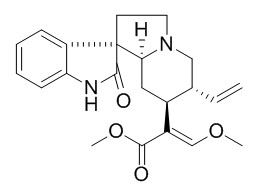Corynoxeine
Corynoxeine is a potent ERK1/2 inhibitor of key PDGF-BB-induced VSMC proliferation and may be useful in the prevention and treatment of vascular diseases and restenosis after angioplasty.
Inquire / Order:
manager@chemfaces.com
Technical Inquiries:
service@chemfaces.com
Tel:
+86-27-84237783
Fax:
+86-27-84254680
Address:
1 Building, No. 83, CheCheng Rd., Wuhan Economic and Technological Development Zone, Wuhan, Hubei 430056, PRC
Providing storage is as stated on the product vial and the vial is kept tightly sealed, the product can be stored for up to
24 months(2-8C).
Wherever possible, you should prepare and use solutions on the same day. However, if you need to make up stock solutions in advance, we recommend that you store the solution as aliquots in tightly sealed vials at -20C. Generally, these will be useable for up to two weeks. Before use, and prior to opening the vial we recommend that you allow your product to equilibrate to room temperature for at least 1 hour.
Need more advice on solubility, usage and handling? Please email to: service@chemfaces.com
The packaging of the product may have turned upside down during transportation, resulting in the natural compounds adhering to the neck or cap of the vial. take the vial out of its packaging and gently shake to let the compounds fall to the bottom of the vial. for liquid products, centrifuge at 200-500 RPM to gather the liquid at the bottom of the vial. try to avoid loss or contamination during handling.
Molecules.2023, 28(7):3039.
Antioxidants (Basel).2021, 10(9):1435.
Molecules.2015, 20(11):20014-30
Biochem Pharmacol. 2023, 210:115463.
Nat Prod Sci.2018, 24(2):109-114
Key Engineering Materials2022, 931(47-53).
Natural Product Communications2020, doi: 10.1177.
J Cell Physiol.2020, 10.1002
Ind Crops Prod.2015, 67:185-191
Separations2021, 8(1), 1.
Related and Featured Products
Planta Med. 2015 Jan;81(1):46-55.
Isolation and identification of twelve metabolites of isocorynoxeine in rat urine and their neuroprotective activities in HT22 cell assay.[Pubmed:
25519834]
IsoCorynoxeine, one of the major alkaloids from Uncaria Hook, shows the effects of lowering blood pressure, vasodilatation, and protection against ischemia-induced neuronal damage. In this paper, the metabolism of isoCorynoxeine was investigated in rats. Twelve metabolites and the parent drug were isolated by using solvent extraction and repeated chromatographic methods, and determined by spectroscopic methods including UV, MS, NMR, and CD experiments.
METHODS AND RESULTS:
Seven new compounds were identified as 11-hydroxyisoCorynoxeine, 5-oxoisocorynoxeinic acid-22-O-β-D-glucuronide, 10-hydroxyisoCorynoxeine, 17-O-demethyl-16,17-dihydro-5-oxoisoCorynoxeine, 5-oxoisocorynoxeinic acid, 21-hydroxy-5-oxoisoCorynoxeine, and oxireno[18, 19]-5-oxoisoCorynoxeine, together with six known compounds identified as isoCorynoxeine, 18,19-dehydrocorynoxinic acid, 18,19-dehydrocorynoxinic acid B, Corynoxeine, isoCorynoxeine-N-oxide, and Corynoxeine-N-oxide. Possible metabolic pathways of isoCorynoxeine are proposed. Furthermore, the activity assay for the parent drug and some of its metabolites showed that isoCorynoxeine exhibited a significant neuroprotective effect against glutamate-induced HT22 cell death at the maximum concentration. However, little or weak neuroprotective activities were observed for M-3, M-6, M-7, and M-10.
CONCLUSIONS:
Our present study is important to further understand their metabolic fate and disposition in humans.
Biol Pharm Bull. 2008 Nov;31(11):2073-8.
Corynoxeine isolated from the hook of Uncaria rhynchophylla inhibits rat aortic vascular smooth muscle cell proliferation through the blocking of extracellular signal regulated kinase 1/2 phosphorylation.[Pubmed:
18981576]
The proliferation of vascular smooth muscle cells (VSMCs) induced by injury to the intima of arteries is an important etiologic factor in vascular proliferative disorders such as atherosclerosis and restenosis. Uncaria rhynchophylla is traditional Chinese herb that has been applied to the treatment of convulsive disorders, such as epilepsy, in China.
METHODS AND RESULTS:
In the present study, we examined whether Corynoxeine exerts inhibitory effects on platelet-derived growth factor (PDGF)-BB-induced rat aortic VSMC proliferation and the possible mechanism of such effects. Pre-treatment of VSMCs with Corynoxeine (5-50 microM) for 24 h resulted in significant decreases in cell number without any cytotoxicity; the inhibition percentages were 25.0+/-12.5, 63.0+/-27.5 and 88.0+/-12.5% at 5, 20 and 50 microM, respectively. Also, Corynoxeine significantly inhibited the 50 ng/ml PDGF-BB-induced DNA synthesis of VSMCs in a concentration-dependent manner without any cytotoxicity; the inhibitions were 32.8+/-11.0, 51.8+/-8.0 and 76.9+/-7.4% at concentrations of 5, 20 and 50 microM, respectively. Pre-incubation of VSMCs with Corynoxeine significantly inhibited PDGF-BB-induced extracellular signal-regulated kinase 1/2 (ERK1/2) activation, whereas Corynoxeine had no effects on mitogen-activated protein kinase (MAPK/ERK)-activating kinase 1 and 2 (MEK1/2), Akt, or phospholipase C (PLC)gamma1 activation or on PDGF receptor beta (PDGF-Rbeta) phosphorylation.
CONCLUSIONS:
These results suggest that Corynoxeine is a potent ERK1/2 inhibitor of key PDGF-BB-induced VSMC proliferation and may be useful in the prevention and treatment of vascular diseases and restenosis after angioplasty.



